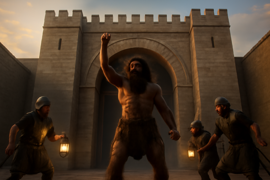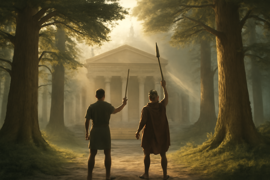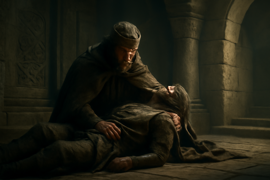Introduction
Beneath the baking sun of ancient Mesopotamia, the great city of Uruk rises from the plains like a jewel of clay and stone. Its walls soar high above date palms and marshes, a testament to human ambition and craftsmanship. At the heart of this city sits Gilgamesh, two-thirds god and one-third man, a king whose strength is unmatched but whose spirit wrestles with an emptiness he cannot name. Despite his power, he finds no rest in the splendor of palace halls or the admiration of his people. From the bazaar’s lively stands to the temple’s flickering braziers, whispers spread of a hero restless for a challenge that might test his might and fill the yawning void in his heart. Meanwhile, in the sacred Eanna district, the gods shape a wild companion to stand beside him—a being of earth and water, ignorant of fields and cities until first light grants him vision. This creature, whom the shepherds call Enkidu, embodies the raw forces of nature unleashed. When their paths finally collide at Uruk’s gate, a tumultuous clash of fists and wills awakens a friendship forged stronger than iron. Together they embark on a quest that will lead them through cedar forests, into the dark shadows of grief, and on a search for the secret of eternal life. Their journey becomes a timeless tapestry of heroism and loss, loyalty and desperation, shining an undying light on what it means to be human.
The Wild Man and the Walls of Uruk
Before forging their legendary bond, two destinies collided beneath Uruk’s mighty ramparts. Gilgamesh, king of the golden city, wore his crown like armor, his heart heavy with the knowledge that power alone yielded no solace. He roamed the streets at night, seeking any rival strong enough to test his arms, yet found only fearful silence in his wake. Meanwhile, far beyond the river’s bend, Enkidu rose from the reeds like a spirit of the wild—his form crafted by the goddess Aruru from fresh clay and river water. He ran with the gazelles, drank from spring hollows, and roared his primeval song to thunder across the plains. Shepherds shuddered when their flocks scattered, and hunters trembled when they glimpsed the great man-beast standing tall against the horizon. The high priestess Shamhat was summoned to tame him with gentle words and the promise of companionship. In her presence, Enkidu learned language and hunger for cooked bread, felt the warmth of shelter, and first recognized the craft of mortals. As he stepped into Uruk’s shadow, the earth seemed to hush in anticipation.

At the city gate, Gilgamesh’s challengers always fell silent beneath his glare, but when Enkidu arrived—hair unkempt and eyes fierce—they grappled in a fury that shook stone foundations. Each blow was met with equal strength, neither willing to yield. Warriors paused their drills and merchants dropped their wares to witness this titanic contest. Sweat and dust rose in eddies, melding with Gilgamesh’s royal purple and Enkidu’s earthen brown until they stood locked in stalemate. Rather than vanquish the other, the two warriors paused, breath heaving, and recognized in each other a kindred spirit unmatched in courage. A silent accord passed between them, and hands clasped in fierce camaraderie. In that instant, the king found purpose beyond loneliness, and the wild man discovered a destiny entwined with the city he once despised. Together they strode into Uruk’s broad avenues, their names destined to be carved into clay tablets by waiting scribes.
Journey to the Cedar Forest
The gods had long whispered of the great Cedar Forest, crowned by the fearsome guardian Humbaba. To claim glory and challenge divine decree, Gilgamesh proposed a journey beyond the Tigris marshes to fell cedar trees for Uruk’s gates. Enkidu, whose wild heart beat for the thrill of adventure, required no urging. They gathered provisions, carved steel weapons, and set out beneath a sky heavy with summer haze. Across whispering reed beds and dusty trails, they traveled until the tops of miles-high cedars shimmered like green flames against the sun. Birds of amber and crimson wheeled above them, and the scent of tanbark filled every breath.

Deeper they pressed until the air hummed with magic, and even Enkidu felt a solemn hush steal over his spirit. Then, at the forest’s heart, they beheld Humbaba—a creature of bark and rotting wood, breath foul as pitch, eyes blazing like coals. Fear rippled through the trees as the guardian’s massive bulk lumbered forward. Gilgamesh stood tall, sword gleaming, while Enkidu growled an ancient challenge that shook branches loose. In the fierce clash that followed, silver steel bit into cedar bone, and roots ripped free to ensnare the combatants. Together they pressed their advantage—Gilgamesh’s cunning strikes and Enkidu’s beastly fury—and at last reduced the great protector to splintered ruin. When the dust settled, the heroes knelt amid fallen giants, drawing strength from each other’s unbroken resolve. Yet in victory’s glow, they heard the distant rumble of divine anger, for no mortal should claim the forest of the gods.
Reverent and trembling, they carved cedar logs and bound them for transport. Each beam shone with resinous life, promising a legacy for Uruk’s temples and gates. But in the silent moments by the riverside campfire, Enkidu spoke of omens—the gods would not forget this sacrilege. Gilgamesh, caught between triumph and dread, gazed at the stars that first night and wondered if hubris had taken root in his heart.
At dawn, the loaded caravans creaked onto the road, and the pair of friends set their faces toward home. Even as they laughed and sang, a tremor of fate trailed in their wake.
Loss, Mourning, and the Quest for Eternity
Triumph turned swiftly to grief when the gods decreed their vengeance. Enkidu fell ill under a heavy curse, his once-vibrant form wasting away like autumn leaves. Gilgamesh knelt by his friend’s side in a courtyard of marble and untended shrubs, calling his name until his voice cracked. Enkidu’s breath came in shallow gusts, and the dreams of his wild youth flickered like candles in the gathering dusk. When at last he spoke farewell, he warned Gilgamesh that no mortal, even one part divine, could escape the shadow of death. His final words implored the king not to let sorrow consume him, even as tears slicked Gilgamesh’s cheeks. When Enkidu drew his last breath, Gilgamesh stood alone, the city’s cheers and the cedar’s memory both blunt in his mind.

In the weeks that followed, the king abandoned his crown and banished attendants who urged him to resume his rule. He wandered desert trails and reed-choked marshes, haunted by nightmares of his companion’s locked face. At Uruk’s walls, scribes recorded his grief in clay, and every echoing gate reminded him of loss’s permanent claim. Then an urgent longing seized him: if death could fall upon the friend he loved, perhaps immortality could be found at last. Against all counsel, he resolved to seek Utnapishtim, the far-distant survivor of the great Flood, who alone held the secret of endless life. Crestfallen couriers followed behind, bearing scrolls that begged him to spare himself, but he would not return. Clad in robes of midnight blue, he set forth under a sky thick with storm clouds, his soul determined to bargain with gods or monsters for one more chance to defy fate.
His journey took him across treacherous mountains and past two gigantic scorpion guardians whose stony eyes measured his resolve. He sailed a ship on the celestial sea until he reached Utnapishtim on a lonely isle, where an eternal fire burned within a noble cedar. There, Gilgamesh learned of the Flood’s wrath and the trials that tested human spirit. Though the immortal granted him a tale of youth-restoring herbs and a ritual to conquer time, the harsh truths of human limitation remained clear: immortality slips from our grasp like water through open fingers. Heart heavy but enlightened, Gilgamesh accepted that his true legacy would be carved not in endless years but in the walls he had built and the stories that would survive him.
At dawn on the return voyage, he watched the horizon with renewed purpose. Mortality, he realized, was the grandest gift of all, lending every breath urgency and meaning. With that wisdom etched into his soul, he turned his face toward Uruk once more.
Conclusion
When Gilgamesh finally returned to Uruk, scarred by grief and tempered by revelation, he found the city walls still rising against the sky, every brick a testament to human toil. He ascended to the ramparts and gazed upon the people bustling below—merchants, shepherds, artisans—each living under the same fate he once feared. In that moment, he understood his gift: to rule with compassion born of loss, to guide his city toward harmony instead of endless conquest. He inscribed his ordeals on clay tablets, ensuring that the tale of Gilgamesh and Enkidu would ripple across generations. Their friendship, as fierce as any god’s decree, taught that no triumph could stand without the humbling truth of mortality. And so, in Uruk’s golden halls and humble homes alike, their story lived on—an undying echo of courage, loyalty, and the quiet power of wisdom.



















